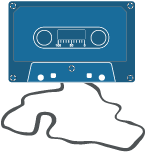Research
What are the channels we use to work with students all good for? Are there key differences between the public channels like Television, YouTube, iTunes and the website channels we use? What about the ones that are more suited to interactivity and mobility?
There are already plenty of a passive, broadcast channel routes out to students. You may immediately think of TV and Radio (both of which are well used by us here in the OU); but in a sense, a book is also pretty passive and broad forms of ‘cast’? So the “what are they good for” issue is a pretty generic question of pedagogy.
Related Research Projects
STEEPLE is the new JISC bid that we are running with Oxford and Cambridge. It will work on finding appropriate support systems within our Universities for developing practices and procedures to support podcasting (and thereby iTunes U) developments. The Open University role will focus on issues such as institutional practices for handling rights and clearance of materials; and on designing for a new broadcast format. It is only a year long but will bring together the 3 key Universities to compare and blend our strengths
iCoper is a new eContent+ EC initiative. This is bringing together many EC repositories into a common framework; our podcasting and iTunes framework is VERY interesting to our EC partners. We will be doing rather a lot of boring work (IMS and things) but also working on sharing our cool best practices (it is a “best practice network”)..
Related OU Channels
Podcast.Open is KMi’s core back-end system for collecting and distributing podcast feeds; you can use it to consume podcast material, of course – but it is also there to give you a channel to produce them too. Collect your thoughts into a series and syndicate out to other channels, like iTunes, Miro or YouTube.
YouTube for the Open University is a participatory video sharing website where selected Open University video materials can be shared, discussed and contributed to.
OpenLearn is the OU’s place of the Open Educational Resources movement. This means that all the content you find on the site is made freely available to you under Attribution-Non-Commercial-Share Alike 2.0 licence (UK: England & Wales). You’re free to download, remix and reuse it any way you wish so long as you stick within the terms of the license. OpenLearn is also about a massive community of learners using some of the coolest web2 communication tools to connect and help each other. These tools are also available under open source licenses by the way!
Open2.Net is an interactive space which acts as the home of BBC/Open University TV and Radio programmes on the web.
